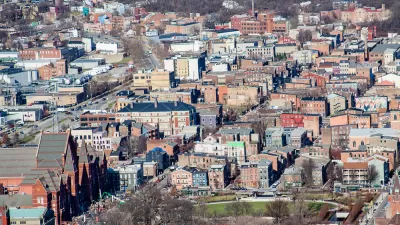CityLab University explains a controversial and misunderstood funding mechanism.

Benjamin Schneider writes a CityLab University explainer for Tax Increment Financing(TIF), a controversial revenue generation mechanism implemented in some parts of the country in various forms.
This mechanism for financing redevelopment is a powerful and controversial force in American urbanism. Every state except Arizona currently allows it, as does the District of Columbia, and it has become the most popular incentive tool for economic development in the United States as the federal government has decreased its urban development spending. TIF plays a role in megaprojects such as Chicago’s Lincoln Yards and Amazon’s HQ2 in Arlington, Virginia, as well as in smaller-scale neighborhood improvements, affordable housing, and transit projects.
Schneider also notes the controversy and debate surrounding TIF:
Depending on the specific project, and whom you ask about it, TIF is an essential mechanism for cities to stimulate much-needed economic development and revitalize neighborhoods at no cost to taxpayers, or it’s an opaque developer giveaway that puts a strain on city services without providing much public benefit.
The article includes a lot more detail by way of illuminating the concept. For additional reading after completing the CityLab article, see also a reference to a recent case study in Vermont and a report written about Tax Increment Financing by the Lincoln Institute of Land Policy in September 2018.
FULL STORY: CityLab University: Tax Increment Financing

Planetizen Federal Action Tracker
A weekly monitor of how Trump’s orders and actions are impacting planners and planning in America.

Congressman Proposes Bill to Rename DC Metro “Trump Train”
The Make Autorail Great Again Act would withhold federal funding to the system until the Washington Metropolitan Area Transit Authority (WMATA), rebrands as the Washington Metropolitan Authority for Greater Access (WMAGA).

The Simple Legislative Tool Transforming Vacant Downtowns
In California, Michigan and Georgia, an easy win is bringing dollars — and delight — back to city centers.

The States Losing Rural Delivery Rooms at an Alarming Pace
In some states, as few as 9% of rural hospitals still deliver babies. As a result, rising pre-term births, no adequate pre-term care and "harrowing" close calls are a growing reality.

The Small South Asian Republic Going all in on EVs
Thanks to one simple policy change less than five years ago, 65% of new cars in this Himalayan country are now electric.

DC Backpedals on Bike Lane Protection, Swaps Barriers for Paint
Citing aesthetic concerns, the city is removing the concrete barriers and flexposts that once separated Arizona Avenue cyclists from motor vehicles.
Urban Design for Planners 1: Software Tools
This six-course series explores essential urban design concepts using open source software and equips planners with the tools they need to participate fully in the urban design process.
Planning for Universal Design
Learn the tools for implementing Universal Design in planning regulations.
Smith Gee Studio
City of Charlotte
City of Camden Redevelopment Agency
City of Astoria
Transportation Research & Education Center (TREC) at Portland State University
US High Speed Rail Association
City of Camden Redevelopment Agency
Municipality of Princeton (NJ)





























